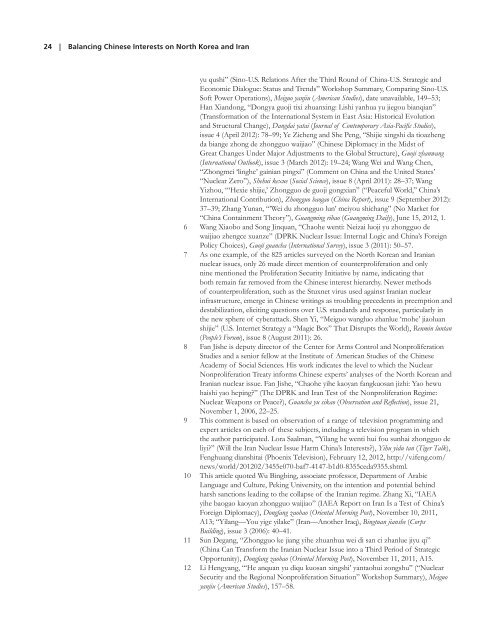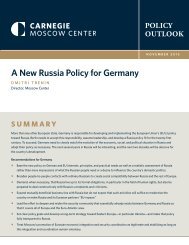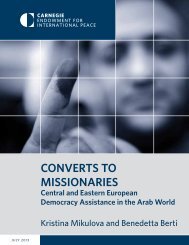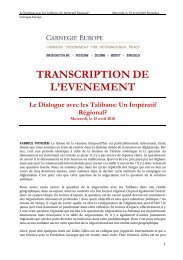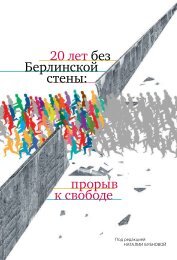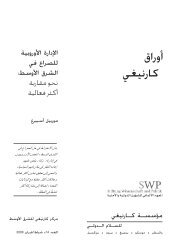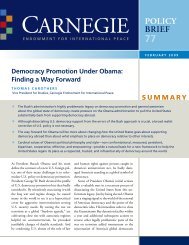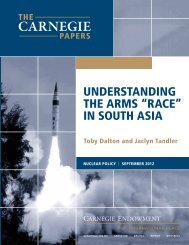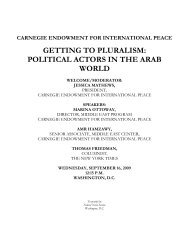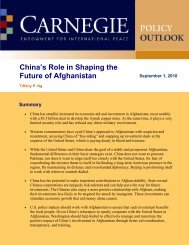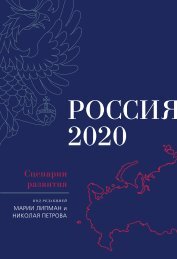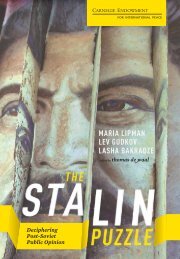BALAncIng chInese InteRests On nORth kOReA And IRAn
BALAncIng chInese InteRests On nORth kOReA And IRAn
BALAncIng chInese InteRests On nORth kOReA And IRAn
Create successful ePaper yourself
Turn your PDF publications into a flip-book with our unique Google optimized e-Paper software.
24 | Balancing Chinese Interests on North Korea and Iran<br />
yu qushi” (Sino-U.S. Relations After the Third Round of China-U.S. Strategic and<br />
Economic Dialogue: Status and Trends” Workshop Summary, Comparing Sino-U.S.<br />
Soft Power Operations), Meiguo yanjiu (American Studies), date unavailable, 149–53;<br />
Han Xiandong, “Dongya guoji tixi zhuanxing: Lishi yanhua yu jiegou bianqian”<br />
(Transformation of the International System in East Asia: Historical Evolution<br />
and Structural Change), Dangdai yatai (Journal of Contemporary Asia-Pacific Studies),<br />
issue 4 (April 2012): 78–99; Ye Zicheng and She Peng, “Shijie xingshi da tioazheng<br />
da biange zhong de zhongguo waijiao” (Chinese Diplomacy in the Midst of<br />
Great Changes Under Major Adjustments to the Global Structure), Guoji zhanwang<br />
(International Outlook), issue 3 (March 2012): 19–24; Wang Wei and Wang Chen,<br />
“Zhongmei ‘linghe’ gainian pingxi” (Comment on China and the United States’<br />
“Nuclear Zero”), Shehui kexue (Social Science), issue 8 (April 2011): 28–37; Wang<br />
Yizhou, “‘Hexie shijie,’ Zhongguo de guoji gongxian” (“Peaceful World,” China’s<br />
International Contribution), Zhongguo baogao (China Report), issue 9 (September 2012):<br />
37–39; Zhang Yunan, “’Wei du zhongguo lun’ meiyou shichang” (No Market for<br />
“China Containment Theory”), Guangming ribao (Guangming Daily), June 15, 2012, 1.<br />
6 Wang Xiaobo and Song Jinquan, “Chaohe wenti: Neizai luoji yu zhongguo de<br />
waijiao zhengce xuanze” (DPRK Nuclear Issue: Internal Logic and China’s Foreign<br />
Policy Choices), Guoji guancha (International Survey), issue 3 (2011): 50–57.<br />
7 As one example, of the 825 articles surveyed on the North Korean and Iranian<br />
nuclear issues, only 26 made direct mention of counterproliferation and only<br />
nine mentioned the Proliferation Security Initiative by name, indicating that<br />
both remain far removed from the Chinese interest hierarchy. Newer methods<br />
of counterproliferation, such as the Stuxnet virus used against Iranian nuclear<br />
infrastructure, emerge in Chinese writings as troubling precedents in preemption and<br />
destabilization, eliciting questions over U.S. standards and response, particularly in<br />
the new sphere of cyberattack. Shen Yi, “Meiguo wangluo zhanlue ‘mohe’ jiaoluan<br />
shijie” (U.S. Internet Strategy a “Magic Box” That Disrupts the World), Renmin luntan<br />
(People’s Forum), issue 8 (August 2011): 26.<br />
8 Fan Jishe is deputy director of the Center for Arms Control and Nonproliferation<br />
Studies and a senior fellow at the Institute of American Studies of the Chinese<br />
Academy of Social Sciences. His work indicates the level to which the Nuclear<br />
Nonproliferation Treaty informs Chinese experts’ analyses of the North Korean and<br />
Iranian nuclear issue. Fan Jishe, “Chaohe yihe kaoyan fangkuosan jizhi: Yao hewu<br />
haishi yao heping?” (The DPRK and Iran Test of the Nonproliferation Regime:<br />
Nuclear Weapons or Peace?), Guancha yu sikao (Observation and Reflection), issue 21,<br />
November 1, 2006, 22–25.<br />
9 This comment is based on observation of a range of television programming and<br />
expert articles on each of these subjects, including a television program in which<br />
the author participated. Lora Saalman, “Yilang he wenti hui fou sunhai zhongguo de<br />
liyi?” (Will the Iran Nuclear Issue Harm China’s Interests?), Yihu yidu tan (Tiger Talk),<br />
Fenghuang dianshitai (Phoenix Television), February 12, 2012, http://v.ifeng.com/<br />
news/world/201202/3455e070-baf7-4147-b1d0-8355ceda9355.shtml.<br />
10 This article quoted Wu Bingbing, associate professor, Department of Arabic<br />
Language and Culture, Peking University, on the intention and potential behind<br />
harsh sanctions leading to the collapse of the Iranian regime. Zhang Xi, “IAEA<br />
yihe baogao kaoyan zhongguo waijiao” (IAEA Report on Iran Is a Test of China’s<br />
Foreign Diplomacy), Dongfang zaobao (Oriental Morning Post), November 10, 2011,<br />
A13; “Yilang—You yige yilake” (Iran—Another Iraq), Bingtuan jianshe (Corps<br />
Building), issue 3 (2006): 40–41.<br />
11 Sun Degang, “Zhongguo ke jiang yihe zhuanhua wei di san ci zhanlue jiyu qi”<br />
(China Can Transform the Iranian Nuclear Issue into a Third Period of Strategic<br />
Opportunity), Dongfang zaobao (Oriental Morning Post), November 11, 2011, A15.<br />
12 Li Hengyang, “‘He anquan yu diqu kuosan xingshi’ yantaohui zongshu” (“Nuclear<br />
Security and the Regional Nonproliferation Situation” Workshop Summary), Meiguo<br />
yanjiu (American Studies), 157–58.


